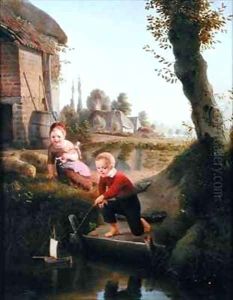Antoine de Bruycker Paintings
Antoine de Bruycker, a Belgian artist, was born in 1879 in Ghent, Belgium. His artistic journey began in his hometown, where he developed a deep interest in the arts at a young age. He received his initial artistic education at the Royal Academy of Fine Arts in Ghent, where he honed his skills in drawing, painting, and printmaking. De Bruycker's early works were influenced by the prevailing artistic movements of the time, including Impressionism and Realism, which were evident in his treatment of light and choice of everyday subjects.
Throughout his career, de Bruycker continued to evolve as an artist, exploring various styles and techniques. He was particularly known for his etchings, a medium through which he achieved considerable acclaim. His etchings often depicted the urban landscapes and architecture of his native Belgium, capturing the essence of the city's streets, buildings, and daily life with a keen eye for detail and atmosphere. De Bruycker's works demonstrated a mastery of light and shadow, which added a dramatic quality to his compositions.
Antoine de Bruycker was not only a prolific printmaker but also an accomplished painter. His paintings often featured similar themes to his etchings, focusing on cityscapes and architectural views. However, they also conveyed a sense of mood and emotion that was characteristic of his personal artistic vision. Despite being less well-known than his prints, de Bruycker's paintings contributed significantly to his legacy in the Belgian art scene.
De Bruycker's artistic contributions were recognized during his lifetime, and he participated in numerous exhibitions both in Belgium and abroad. His works found their way into private collections and museums, helping to cement his reputation as an important figure in Belgian art history.
Antoine de Bruycker passed away in 1964, leaving behind a body of work that continues to be appreciated for its technical skill and artistic beauty. His etchings, in particular, remain highly regarded by collectors and art historians, and serve as a testament to his dedication to capturing the spirit of his time and place. De Bruycker's legacy is preserved through the continued study and exhibition of his works, ensuring that his contributions to the world of art are not forgotten.

